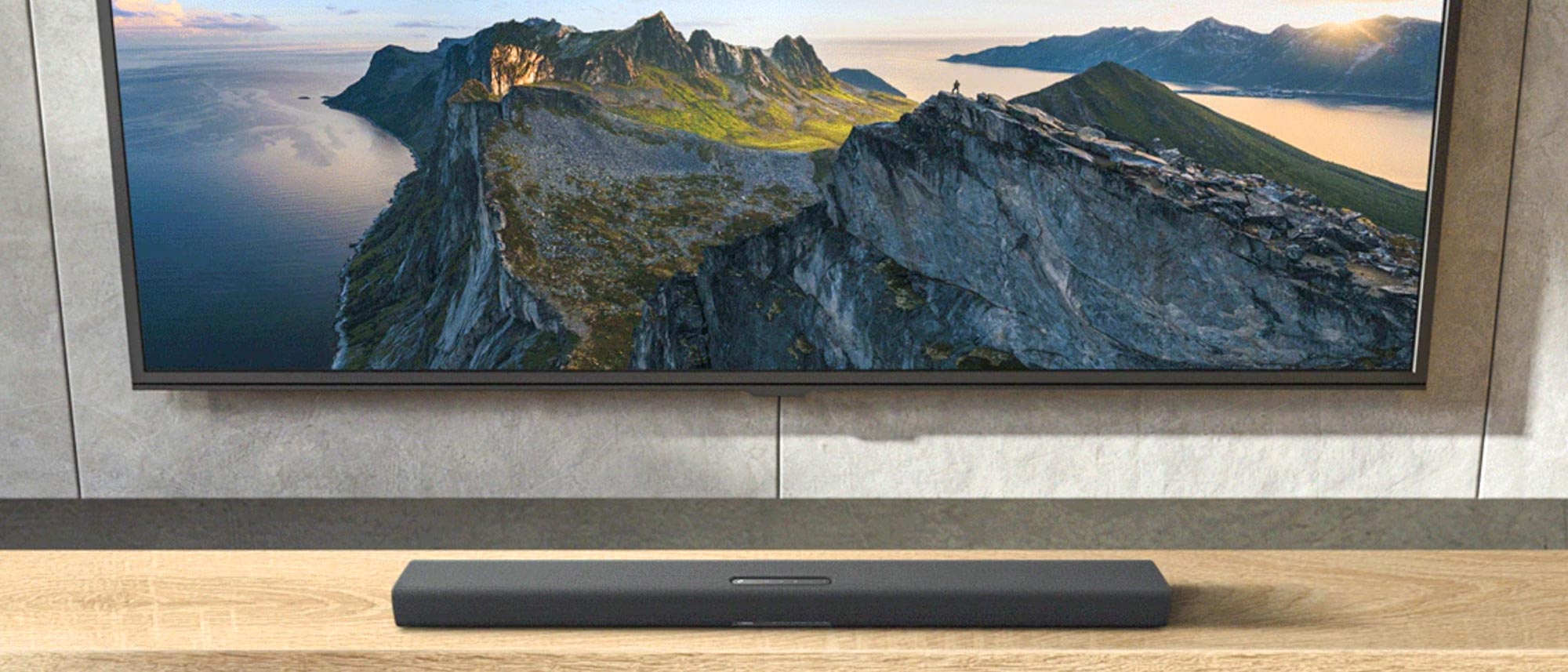Tom's Guide Verdict
The Yamaha True X Bar 40A delivers immersive Dolby Atmos sound and impressive frequency response for under $500. We also like the sleek and textured design and port selection. Just don’t expect the best bass without a subwoofer.
Pros
- +
Solid frequency response overall
- +
Good immersion
- +
Helpful smart features like AirPlay 2
- +
Affordable
Cons
- -
Bass is a little thin without a subwoofer
- -
Better systems for the price of the soundbar, subwoofer and surround speakers
Why you can trust Tom's Guide
Size: 40 x 4.4 x 2.5 inches
Ports: HDMI eARC output, HDMI in, Ethernet port, optical, USB (service only)
Dolby Atmos speakers built-in: Yes
Audio channels: 2.2.2
Wireless: Bluetooth, Wi-Fi, Spotify Connect, Tidal Connect, Apple’s AirPlay 2
Subwoofer: No
Power output: 180W
Wall mountable: Yes
Over the past few years, Dolby Atmos has become much more mainstream. It is now offered not only in the better-performing and more expensive soundbar systems, but also in a range of more affordable options. While the first super affordable Dolby Atmos soundbars have started coming out, however, there’s still room in the market for great mid-range options — options for those who want a little more from their soundbar than the ultra-budget models can provide.
That’s exactly where the Yamaha True X Bar 40A soundbar comes in. It’s a little more expensive than the cheapest Dolby Atmos soundbars out there, built to deliver a little more oomph and audio prowess while still catering to a budget. Yamaha has also built this soundbar to deliver deeper bass and it offers built-in subwoofers in a slim package.
Can the Yamaha True X Bar 40A soundbar deliver on those promises and be one of the best soundbars? I’ve been using it for a while now to find out.
Yamaha True X Bar 40A review: Price and availability
The Yamaha True X Bar 40A is now available online from the Yamaha website for $499.95 (£549.00), as well as from other online retailers like Amazon and Best Buy. The soundbar is only available in black, and it does not seem as though the soundbar is available in Australia, despite the True X Bar 50A being available.
Yamaha True X Bar 40A review: Design
The Yamaha True X Bar 40A isn’t necessarily compact like the Sonos Beam, but it’s still relatively small compared to many other options. The soundbar measures 40 inches wide by 4.4 inches deep and 2.5 inches high. It’s a little deeper than some other options, but I was able to fit it comfortably between the legs of a 65-inch TV.
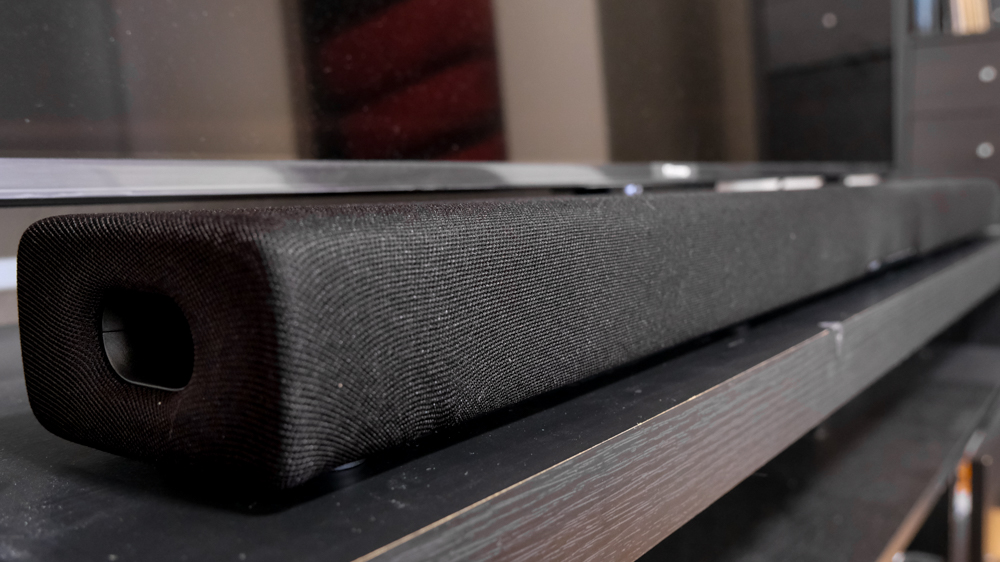
The True X Bar 40A is a relatively stylish soundbar too. It has a nice textile covering the majority of the body with sound ports on either side. On the top, there’s a selection of buttons for manual control, including volume buttons, a microphone mute button, an input selector and a power button. On the front, you’ll get LED lights to indicate which input or inputs you’re using or are connected.
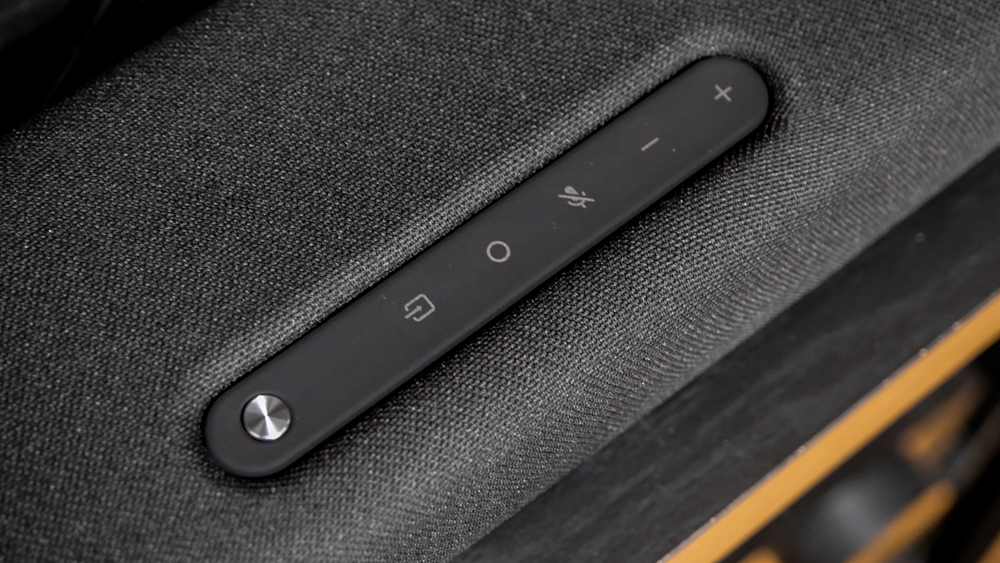
This Yamaha soundbar comes with a remote too, though given the HDMI CEC support, you may not use it all that much. The remote comes with the controls you’d expect, including separate buttons for volume and so-called subwoofer or bass control. There are also surround speaker controls and the ability to switch sound modes, mute the volume or switch inputs. The remote looks and feels a little cheap, but it gets the job done.
The soundbar alone doesn’t come with surround speakers, but you can use surround speakers with it. The soundbar supports the Yamaha True X Speaker 1A as surrounds, and we used them in our setup for some of our testing. The True X Speaker 1A is incredibly small and compact, measuring only 3.5 x 4.1 x 3.5 inches. These speakers are actually built to be portable and have a battery built into them, though you can keep them powered up and ready to use with the soundbar if you want.
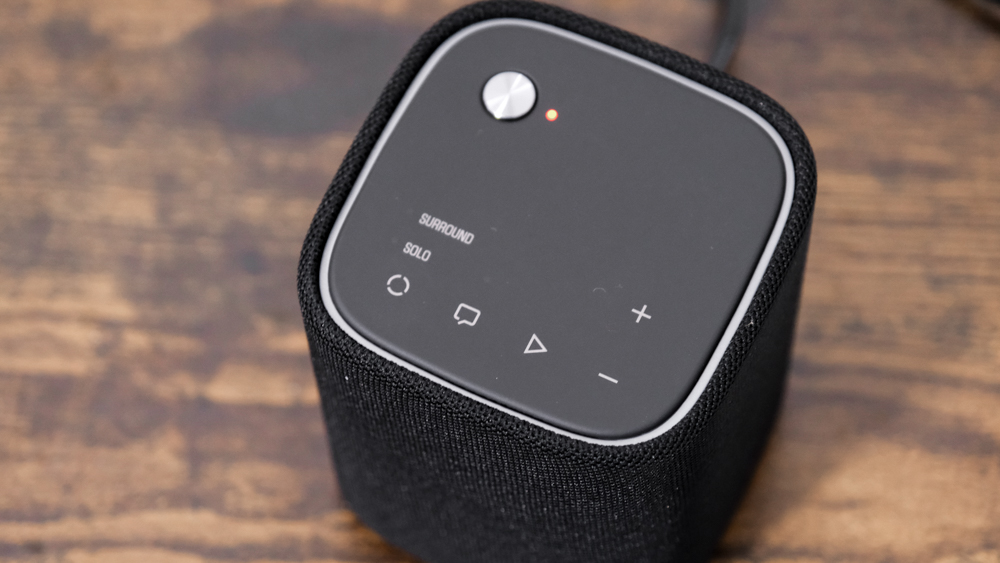
Setting these speakers up with the soundbar was relatively easy. You’ll simply put them in surround pairing mode and hit the setup surround button on the remote. The soundbar should recognize the surround speakers on its own. Lastly, the soundbar supports the Yamaha True X Sub 100A subwoofer, but we didn’t have one on hand to test with.
Yamaha True X Bar 40A review: Connectivity and controls
The True X Bar 40A offers a reasonable selection of ports, including an HDMI eARC output, an Ethernet port, an optical port and a USB port, which Yamaha notes is only for firmware updates. There’s also an HDMI input, so you can use the soundbar to pass through an HDMI signal and take advantage of all the ports on your TV. Unfortunately, this HDMI passthrough port only supports 4K 60Hz, so you won’t be able to use the soundbar on the same port that you want to get higher refresh rates.
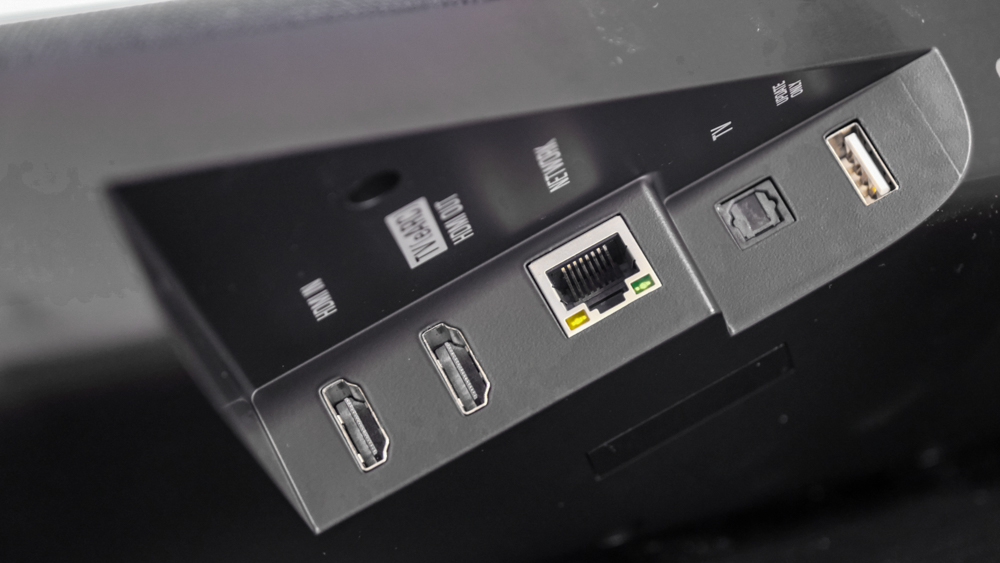
Like other modern soundbars, the Yamaha True X Bar 40A also has a number of wireless connectivity options. The soundbar supports Bluetooth and can connect to Wi-Fi for Spotify Connect, Tidal Connect, and Apple’s AirPlay 2. This means you can use the soundbar as part of a multi-room setup in Apple’s ecosystem.
The soundbar can accept HDMI CEC controls, so unless you want to access soundbar-specific controls for things like the surround speakers, you can use your TV or a streaming device’s remote instead of the soundbar’s remote.
Lastly, the True X Bar 40A can be controlled with the Yamaha Sound Bar Connect app. The app is relatively bare-bones, but it does let you control the volume for any connected surround speakers, select sound modes and set up Alexa, which can also be signed into on the soundbar. If you’re anything like me, you’ll set up the settings that you like, including the volume for the surround speakers, and then largely avoid using the app or the dedicated soundbar remote.
Yamaha True X Bar 40A review: Performance
Under the hood, the True X Bar 40A offers dedicated drivers for the left and right channels, along with two dedicated height drivers and two three-inch woofers for bass. With the surround speakers, you’ll also get additional rear channels. However, you’ll have to buy those surround speakers separately at $150 a pop.
The Yamaha True X Bar 40A isn’t going to compete with much more expensive soundbars, but for the price, it offers solid performance overall. This was true no matter what I watched or listened to. In an immersive movie with lots of sound effects like “Deadpool 2,” the soundbar was able to pump out decent bass for things like gunshots and made for a more immersive listening experience than I expected.
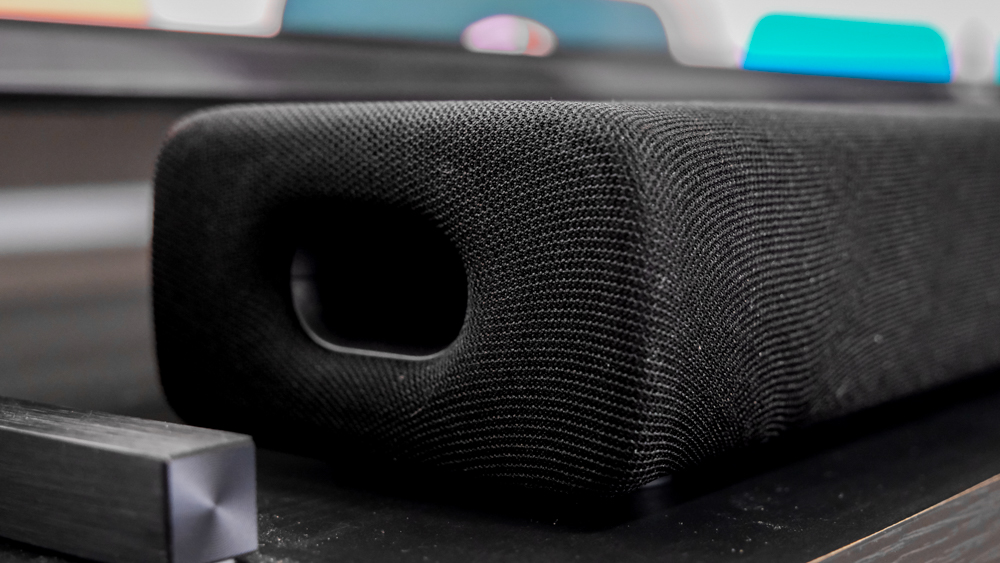
The soundbar was able to deliver decent bass for a soundbar in this price range, but don’t expect it to offer subwoofer-like bass performance as Yamaha might have you believe. The bass isn’t bad, to be clear, but a subwoofer (sold separately for $249) would definitely help add to the low end and give more depth to things like explosions and gunshots in movies, not to mention kick drums and bass guitars in music. When listening to a track like AC/DC’s “Back in Black,” the kick drum was a little weaker than I would have liked. Playing with the bass extension setting can help with this a little. Beyond that setting, you can also turn up the bass frequencies using the app — though it won’t magically help the soundbar produce frequencies it’s physically not capable of producing.
The mids through the True X Bar 40A sounded well-tuned, with a good low-mid response that didn’t err on getting muddy, and there was enough bite in the higher mids to avoid a cheap overall feel to the audio. It did feel like there was a slight cut in some of the mid frequencies, but it wasn’t over the top. If that cut leads you to feel like dialogue is difficult to hear (it didn’t for me), the Clear Voice button will emphasize vocal frequencies a little more. I didn’t love what the Clear Voice setting did to non-vocal audio, though.
The high-end detail offered by the True X Bar 40A was pretty good, too. You won’t get the same clarity that you get from much more expensive systems, but that’s to be expected. You’ll still be able to hear detail from percussion in music and sound effects in movies and TV shows. A little extra clarity in those high frequencies would have been nice, but it certainly didn’t feel like they were overly cut off.
Of course, one of the big advantages of this soundbar is the fact that it delivers Dolby Atmos at a lower price. I was pleasantly surprised by the Atmos performance offered by this soundbar. As mentioned, it made “Deadpool 2,” a movie with plenty of sound effects, that extra bit more exciting, even though the soundbar certainly didn’t make for a cinema-like experience. The height channels were a little more effective than I expected them to be, though mostly in the smaller of the two rooms that I tested the soundbar in. In the larger space (my living room, as opposed to the guest room), the Atmos effect was cut short by quite a bit – and it became clear that the soundbar was better-suited to smaller spaces.
The surround speakers did help with immersion, though mostly through adding the rear channels rather than by adding anything to the height of the audio. Still, when the surround speakers were turned off, I was surprised at the effect that the soundbar alone was able to produce, given its price. And despite the super small size, the surround speakers still sounded like they fit with the soundbar, delivering enough depth to add immersion without feeling thin or poorly matched.
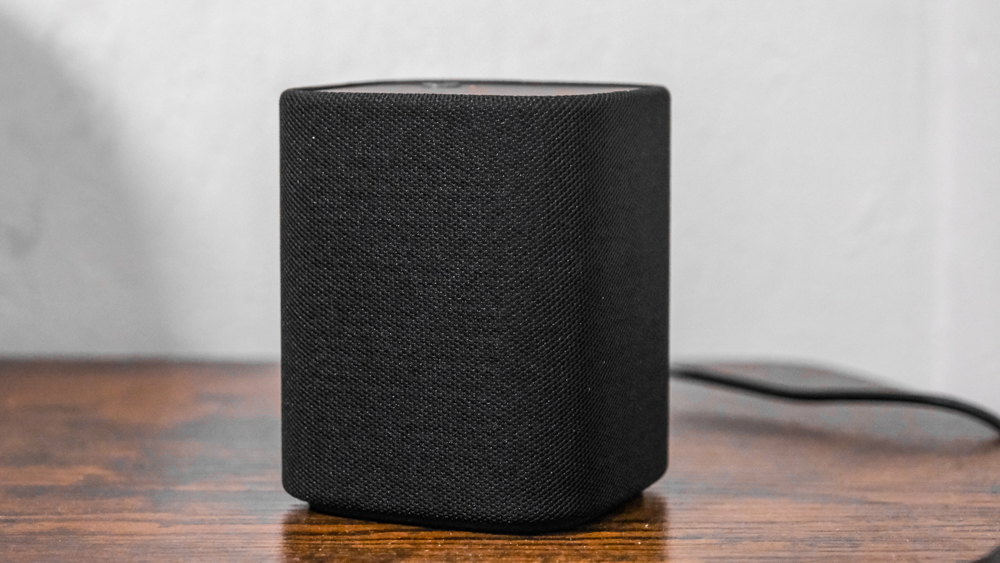
Yamaha True X Bar 40A review: Verdict
For the right person, the Yamaha True X Bar 40A has a lot to offer. It delivers a solid frequency response, and the Atmos effect certainly helps with the immersiveness. This soundbar is better suited to those with a cozier living room or who plan on using it in a smaller space. If you have a larger space, while it’ll still get loud enough, don’t expect the soundbar to produce the same level of immersion.
Of course, the question remains whether you should buy the soundbar alone, with a subwoofer, with surround speakers or both. I didn’t have a subwoofer to test with the soundbar, and I did feel like the bass was a little thin. However, I recommend that those who can afford it spend the extra cash, as it’ll add a whole lot more depth to your sound system. In testing, I found that the surround speakers added a deeper level of immersion to the overall audio quality — but the soundbar also wasn’t bad at being immersive on its own. If you’re only willing to buy either the subwoofer or the surround speakers, I recommend going for the subwoofer.
If you were going to drop the extra cash for the subwoofer and the surround speakers for around $1,000, then it’s probably worth looking at Samsung’s selection of soundbars instead. In fact, at the time of this writing, you could get the Samsung HW-Q990C soundbar with the subwoofer and surround speakers for around $1,000 (discounted from $1,900), which is an incredible price for what could be the best soundbar system from 2023 (it has been updated for 2024, and the new version comes at full price). If you want a subwoofer and surround speakers all in one package, and aren’t willing to spend much more than $500, then it’s worth looking at the Vizio M-Series instead. But if you’re looking for an Atmos-compatible soundbar for $500 or less, the Yamaha True X Bar 40A is the way to go for those who have a smaller room and prioritize a great frequency response over a high level of immersion.
Yes, there are better options than the Yamaha True X 40A. But at this price, the True X 40A is a well-rounded option with additional features and an excellent audio quality overall, and you won’t regret buying it.
Christian de Looper is a freelance writer who has covered every facet of consumer tech, including mobile, audio, home theater, computing, gaming, and even car tech. At Tom’s Guide, Christian covers TV and home theater tech, and has reviewed dozens of TVs, soundbars, and A/V receivers, including those from the likes of Samsung, Hisense, TCL, and Vizio.
